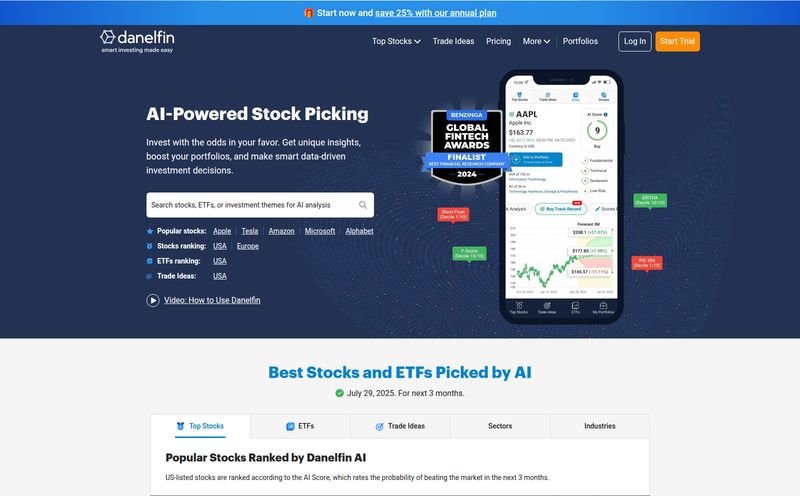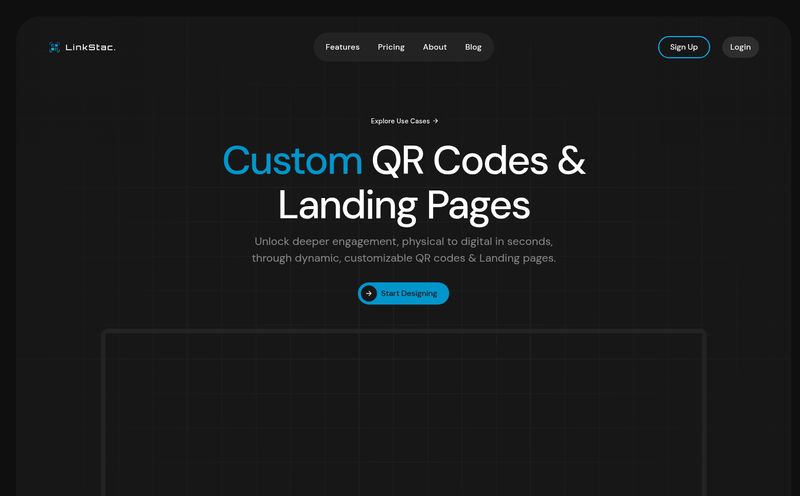The world of active investing can feel like you’re trying to win a Formula 1 race on a tricycle. On one side, you have the massive hedge funds with their armies of PhDs, proprietary algorithms, and servers co-located next to the exchange's. And on the other side... well, there’s us. The retail crowd, trying to make sense of things with a mix of gut feelings, a few analyst reports, and way too much time spent on r/wallstreetbets.
For years, the dream has been to level the playing field. To get access to the same kind of systematic, data-driven tools the big guys use. I've seen countless platforms promise this, often wrapped in complicated interfaces or requiring you to learn Python overnight. It's been frustrating. But recently, a platform called Composer caught my eye. It claims to offer AI-powered, automated trading strategies without needing to write a single line of code.
A bold claim. So, as someone who’s spent more years than I’d like to admit navigating the choppy waters of SEO, CPC, and traffic generation—which is all about data-driven strategy—I had to see if Composer could actually walk the walk. Is this the real deal, or just another shiny object?
So What Exactly Is Composer?
Imagine if you could sit down with a quantitative analyst, describe a trading idea you have, and they could instantly build it, test it against historical data, and then run it for you automatically. That’s the elevator pitch for Composer. It’s an automated trading platform designed for regular people who are serious about their investments but don't have a background in computer science.
Instead of writing code, you use a visual, drag-and-drop editor. It’s built on simple “if-then” logic. Think of it like building with LEGOs. You have different blocks representing different actions or conditions—like “if the 50-day moving average crosses above the 200-day moving average, then sell 20% of my tech stocks and buy 20% in gold.” It’s a beautifully simple way to express some pretty complex ideas.
This isn't just about simple triggers, either. The platform lets you build entire portfolios that react to market conditions. It’s a fundamentally different approach from the classic “buy and hold” strategy or the emotional rollercoaster of manual trading.

Visit Composer
The Core Features That Genuinely Impressed Me
I've seen a lot of platforms over the years, and most are just repackaged versions of the same old thing. Composer felt… different. Here are the bits that stood out.
AI-Assisted Strategy Creation
Okay, I’m always skeptical of the term “AI.” It’s slapped on everything these days. But Composer's implementation is actually pretty slick. You can give it a prompt, like “Create a portfolio that rotates between aggressive growth stocks and bonds based on market volatility,” and it will generate a complete strategy for you. It’s not a magic bullet, but it's a fantastic starting point. It helps you get over that initial “blank canvas” paralysis and gives you a template you can then tweak and make your own.
Backtesting is Your Financial Time Machine
This, for me, is the absolute crown jewel. Before you risk a single real dollar, you can take your newly built strategy and test it against years of historical market data. You can see how it would have performed during the 2008 crash, the 2020 pandemic dip, or the bull run of the last decade. I can't tell you how many costly mistakes in my early days could have been avoided with a tool like this. Gut feelings are expensive; data is cheap. Backtesting lets you fail and learn on paper, not with your life savings.
Automated Execution and Rebalancing
Once you’re happy with your backtested strategy, you can set it live. Composer will then automatically execute the trades for you in your connected brokerage account. This is huge. It removes the two biggest enemies of the average investor: emotion and time. No more panic selling during a dip. No more forgetting to rebalance your portfolio for six months. The machine just does what you told it to do. It’s discipline by design.
A Community of Traders to Learn From
One of the coolest, and maybe underrated, features is the community aspect. You can browse strategies created by other users, see their performance, and even “remix” them. If you find a strategy you like but want to add your own twist—maybe swap out one ETF for another—you can copy it and modify it in seconds. It turns a solitary activity into something more collaborative.
Let's Talk Money: The Composer Pricing Structure
Alright, nothing this cool is ever completely free. The pricing model is pretty straightforward, which I appreciate. No hidden fees designed to trip you up.
| Plan | Cost & Terms | What You Get |
|---|---|---|
| Crypto Trading | No subscription. 0.2% commission per trade. | Ability to buy and sell select cryptocurrencies. Note: Only available in certain states. |
| TradingPass (Stocks & IRA) | $32/month, billed annually ($384/year). Includes a 14-day free trial. | Everything. Fully automated stock and ETF strategies, the no-code builder, backtesting, AI assistance, and retirement account support (Roth & Traditional IRAs). |
| Business Account | Contact for pricing. | Designed for funds, family offices, and financial entities. Includes API access. |
The $32/month fee for the TradingPass might give some people pause. But let's put it in perspective. How much does one bad, emotional trade cost you? Or the opportunity cost of a poorly managed portfolio? For the right kind of investor, that fee could easily pay for itself many times over. The 14-day free trial is also a nice touch, letting you properly kick the tires before committing.
The Good, The Bad, and The Complicated
No tool is perfect. Let's break it down, honest-style.
The Good Stuff
The biggest pro is the democratization of algorithmic trading. This kind of power was simply unavailable to retail investors a few years ago. The no-code editor is intuitive and genuinely fun to use. And the backtesting feature is, as I’ve said, a total game changer. I also have to give them major points for the retirement account integration. Using these kinds of tax-smart, active strategies in a Roth or Traditional IRA is a seriously powerful concept for long-term growth.
The Not-So-Good Stuff
The monthly subscription fee for stock and IRA trading is the most obvious hurdle. It immediately prices out casual investors who just want to buy a few shares here and there. This is a tool for people who are serious. The crypto trading is also a bit of a mixed bag. The 0.2% commission per trade is okay, but not the best on the market, and the fact that it's only available in select states is a definite drawback for many.
Who Is This Really For?
After playing around with it for a while, I have a pretty clear picture of the ideal Composer user.
This is for you if:
- You're a data-driven person who loves to tinker and optimize systems.
- You're a busy professional who understands the value of a systematic approach but doesn't have time to watch charts all day.
- You want to remove emotion from your investment decisions and stick to a disciplined plan.
- You’re interested in exploring more active strategies within the tax-sheltered wrapper of an IRA.
This is probably not for you if:
- You're a die-hard Boglehead who believes in buying a low-cost index fund and never touching it.
- You're looking for a simple app to just buy and sell stocks with zero fees.
- You think this is a “get rich quick” button. It’s a tool for strategy, not a magic money machine.
My Final Verdict: A Glimpse into the Future?
So, is Composer the holy grail of retail investing? No, of course not. Nothing is. But it is one of the most innovative and empowering platforms I've seen in a long, long time. It successfully bridges the gap between simple, often inadequate, retail tools and the hyper-complex, inaccessible world of institutional quant trading.
It demands a certain level of engagement. You still have to bring the ideas and the curiosity. But it provides the framework to build, test, and execute those ideas with a sophistication that was previously out of reach. For the right person, Composer isn’t just a tool; it's a new way of thinking about the markets. And that, in my book, is pretty exciting.
Frequently Asked Questions
- Do I need to know how to code to use Composer?
- Absolutely not. That's the whole point! Composer uses a visual, no-code editor where you piece together trading logic like building blocks. If you can understand "if this happens, then do that," you can build a strategy.
- Can I really use Composer for my IRA?
- Yes, and it's one of its strongest features. Composer supports both Traditional and Roth IRA accounts, allowing you to run your automated, tax-smart strategies in a retirement account.
- Are there any hidden fees besides the subscription?
- Composer is pretty transparent. For stocks/ETFs with the TradingPass, the main cost is the subscription. There may be minor regulatory fees passed on from the clearing firm, which is standard across the industry. For crypto, the fee is the 0.2% commission per trade.
- Is there a free trial for the TradingPass?
- Yes, they offer a 14-day free trial for the TradingPass. This gives you full access to the stock and IRA features so you can build, backtest, and see if it's a good fit before you pay anything.
- Is Composer a brokerage? Is my money safe?
- Composer itself is a tech platform. Your actual brokerage account is held with a partner brokerage (like Alpaca Securities LLC), which is a member of FINRA and SIPC. This means your securities are protected up to $500,000, which is the industry standard. Your money isn't held by Composer directly.
Reference and Sources
- Composer Official Pricing Page
- Investopedia: Basics of Algorithmic Trading
- Forbes Advisor: What Is A Robo-Advisor?



